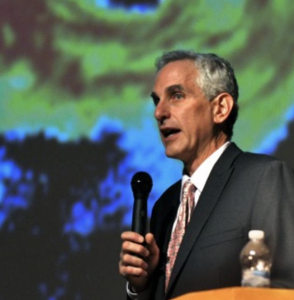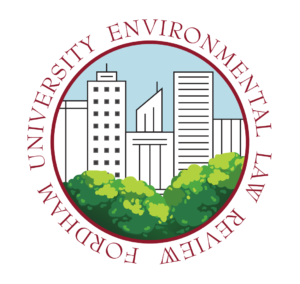Spotlight Series #2: Professor Andy Buchsbaum – From Activist to Advocate and Back
by Michael Albalah, Managing Editor, Fordham Environmental Law Review Journal
Professor Andy Buchsbaum is, and has always been, an activist. Nowadays this ethos is channeled through his work with the National Wildlife Federation, until recently as Vice President for Conservation Partnerships and now as their attorney on a major battle over an oil and gas pipeline, and as an adjunct professor at the University of Michigan Law School. Prior to law school, Professor Buchsbaum worked on a variety of projects for Ralph Nader. That experience proved formative; it solidified his identity as a local and regional organizer, using activism to change people’s lives for the better. Professor Buchsbaum didn’t plan the way so many of us do (he graciously acknowledged how timing, certain privileges, and luck helped him succeed). But he really expressed the practical and psychological value of determining which social problems matter most before deciding how to apply your legal degree. For him, passion for public service and openness to experience tracked him from organizer to courtroom advocate, and back to organizing, always for the public interest. Both his experience and his expertise as a teacher of activism at the University of Michigan Law school made him the perfect person to address questions like, who should do impact litigation, when should you transition to a different role, how can being a lawyer make you a more impactful citizen.
Having a role model is helpful for anyone considering career choices, and for Professor Buchsbaum, it is Ralph Nader. He was inspired by Mr. Nader’s mission orientation and his energy and focus when it came to using practical tools to make real change. Activism became his calling. He worked on difficult local problems helping labor organizers respond to production plant closings. Through that work, he learned dynamic political skills by organizing media, lobbying, and coordination to accomplish a long-term goal.
After law school, Professor Buchsbaum continued his nontraditional advocacy work by directing issue campaigns for the Public Interest Research Group (PIRG) in Michigan, where he led a successful effort to pass a state law to make polluters pay. He then shifted to a more traditional legal role, working as a public interest litigator for the National Environmental Law Center bringing citizen enforcement actions under the Clean Water Act. It was here that Professor Buchsbaum had a revelation of sorts. Instead of viewing these companies as monolithic inaccessible enemies, he began to understand how they worked. This in turn helped him understand the levers of power within an organization, which would help inform his activism in the future.
After seven years of citizen enforcement litigation, Professor Buchsbaum had a second revelation. Despite the gratification of achieving many successful results, he realized that activism, his first love, was his true love. He left the National Environmental Law Center as a litigator and went to the National Wildlife Federation where until recently he currently served as Vice President for Conservation Partnerships.
The National Wildlife Federation is the largest private, nonprofit conservation education and advocacy organization. Because the organization is a federation of 53 state and territorial organizations, it espouses a common agenda. Among others, primary goals are to increase healthy fish and wildlife populations and enhance people’s connection to wildlife, long-held goals that Professor Buchsbaum held in all his professional capacities. He spent last semester teaching Water Wars: Law and Advocacy to Save the Great Lakes, which covers the public trust doctrine, Water Law, the Clean Water Act, and other environmental laws, and even Maritime Law and their role protecting the Great Lakes. This semester, for the first time, Professor Buchsbaum is teaching a course specifically devoted to the practice of social activism, a subject matter that besides being a veteran and expert, he was trained in as part of his Master of Laws from Georgetown University Law Center. Non-litigation activism aims to build political power. This means responding to crises, anticipating systemic flaws, legislation, or administrative action, as well as lobbying, report writing, and other non-traditional legal tools. Litigation is a last resort as the more sustainable solution would be growing political power. After all, as stewards and citizens, we would all much rather companies and governments do the right thing without having to be sued!
Professor Buchsbaum believes in choosing a substantive goal, sometimes that can be a specific policy goal, or maybe it’s a political or organizational power goal, and then doing the work to achieve those goals. This work requires patience and doggedness, for him, the work is fulfilling. The opportunity to change an individual’s life is a privilege and the experience of helping people and wildlife continues to motivate his work regionally. Professor Buchsbaum believes you should make a living without sacrificing fulfillment.
Andrew P. Buchsbaum earned his BA, magna cum laude, from Harvard College, his JD from the University of California Boalt Hall School of Law, and his master of laws in advocacy from Georgetown University Law Center. Until recently, he was the vice president for conservation partnerhips for the National Wildlife Federation (NWF). Formerly NWF’s Great Lakes director for more than a decade, he was the co-chair of the 110-organizational member Healing Our Waters Coalition and a trustee of the Great Lakes Fisheries Trust. Prior to joining NWF, Professor Buchsbaum worked as the program director for the Public Interest Research Group in Michigan and as the senior and coordinating attorney for the Midwest office of the National Environmental Law Center.


